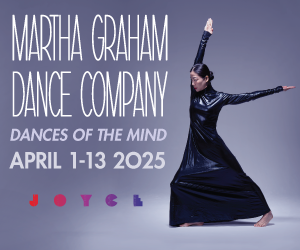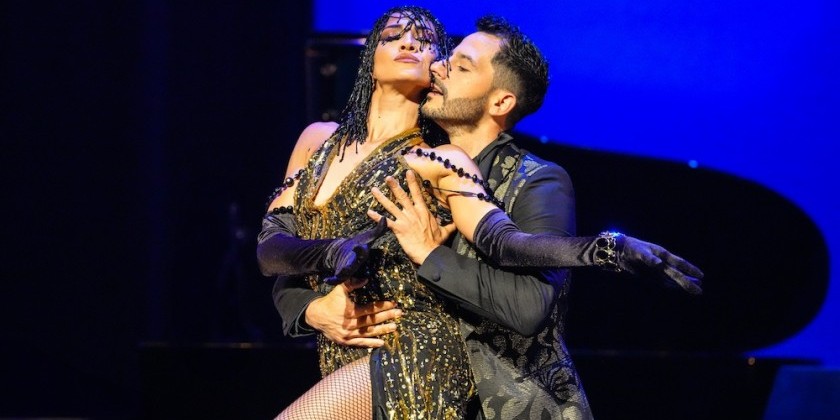AUDIENCE REVIEW: At the Annenberg with Kun-Yang Lin/Dancers (KYLD)

Company:
Kun Yang Lin/Dancers
Performance Date:
April 22, 2021, 7 PM
Freeform Review:
In their latest concert creation, livestreamed from the Annenberg Center at the University of Pennsylvania, Kun-Yang Lin and five of his dance artists offer a sequence of movement meditations perfectly calibrated to the present moment. For performing artists, the time of COVID and quarantine has been a time when pieces of our past return in ways that reveal new dimensions of what we thought we knew. It has been a time to go deeper into solo practices, cultivating the sensory awareness that animates our dancing bodies. Both of these dynamics appear in the six succinct dances of this concert, performed with commitment and heart.
The concert begins with New Normal?. Three dance artists walk back and forth across the stage. While they stride with intention, they have nowhere to go. When their paths cross, the dance artists do not acknowledge one another. They are random atoms or dust particles, pinging through space, largely in the dark. When Evalina Carbonell breaks out in a solo that explodes with grounded physicality, the lights play on the bare parts of her body – face, hands, calves – while the rest of her recedes into the shadows. It’s as if her movements are revealing the effort required to hold these lit parts together – the effort of cohering as one self. When joined by the other two dance artists in unison sequences, Carbonell appears both alone and not alone – she is one among others who are also in their isolated spaces, also working to hold their bodily selves together.
In the second piece, Inside, the supple Weiwei Ma, dressed all in white with powder blue socks, dances with a white plastic folding chair. The chair is fragile and light, and yet Ma clings to it as if it were a life raft in an ocean. The chair becomes a safe haven, as Ma peers through the back, gazing out into the world. Even though Ma stretches her limbs to impressive extremes, she never leaves the chair, periodically retreating to its safety, balling herself within it, and moving alongside as if to embrace it. In the final moment, Ma curls up next to the chair and places her palm gently on the seat.
Renaissance begins with a pile of crumpled red tulle that slowly swells and convulses. Something is inside, and we do not know what. Here as in the other dances, the lighting design makes excellent use of the sleek stage floor, creating reflections around the dancers of their own forms. It is as if Annilille Gavino, swathed in red mesh, emerges from a still pool; she is a water creature becoming an air creature, like every baby born. When she finally pushes her head and hands out of her sac, she might be a plant or octopus – until she walks away from her container, becoming a self as she makes luminous gestures that trace the curves of her body.
In Spring, bright lights reveal a sprightly couple in a sweet duet. Keila Pérez-Vega and Wangbo Zhu are alternately shy and exuberant; they move away from one another, then back again with rushes of courage and joy. A final sequence of movements, with the couple on the floor at a distance from one another, leads to a satisfying ending in which Pérez-Vega leads Zhu offstage.
In the fifth piece, The Calling, Lin's work soars. The Calling is the largest piece, involving five dance artists (adding Grace Stern), whose synchronized circular movements evoke an immediate sense of awe. Something is coming – imminent and new – and these dance artists will be there to receive it. The piece is an excerpt from The Faith Project/The Door, Lin’s journey into the heart of religious commitment (Full disclosure: I worked with the company as a thought partner for The Faith Project/The Door). This segment crescendos into a flurry of whirling movement that seems to go on blissfully forever. Each dance artist turns around his or her self in a manner reminiscent of the Mevlevi dervishes, who spin to draw the divine through their bodies and into the world. When the dance artists settle into standing, palms pressed together, held over their hearts, we center ourselves with them, as the concert segues into the final piece Wind.
Kun-Yang Lin walks onto the stage to dance, for the first time since 2013, as if buoyed by currents of air. He moves with palpable presence and precision, curving shapes in space that cut like the tip of a calligrapher’s pen. In a repeating motif, his hands pat his legs, his arms, his torso and heart, as if he is rediscovering himself, putting pieces back together, and finding a new whole.
In the dazzling final moment of the concert, the screen image shifts to a camera at the back of the stage that faces outward. Viewers see the six company members, socially distanced on and off the stage, stepping in unison in place, flanked by rows of empty seats. As the dance artists rock back and forth and side to side, pulsing with untapped potential, they let us know: they are still here. They are still moving, and they are ready to move some more, cascading forth in streams of new dancing that will pull people into the seats around them. A beautiful vision!
For more about this dynamic company, see www.kyld.org.
Author:
Kimerer L LaMothe, PhD
Website:
www.kimererlamothe.com
Photo Credit:
KYL/D












